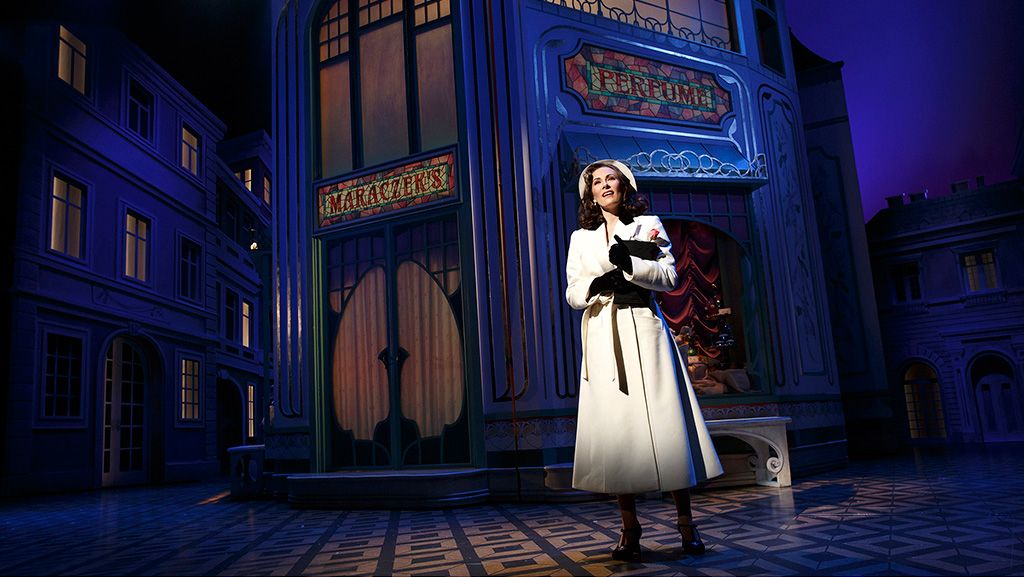“You’re seeing some really weird shit,” Laura Benanti is saying to me. We’re alone in the small, neat gym at a hotel on West 55th Street, and the actress is completely folded over, bent double, hands flat on the floor, knees straight. A moment ago, she was chugging away on a treadmill, doing vocal exercises as she breathed: scales, roller-coaster up-and-down glissandos, and some kind of grunty, gargly sinus thing that probably has a prettier name than it should. She does that for a while more, and then pauses. “Now you see why I can’t do it when people are in here. They’d be like, Shut up!” She’s right: It’s a little weird. But it’s also fascinating to hear a powerful soprano, perfectly on-key and unamplified, filling up an unexpected room, her trills ricocheting off of the stair-climbers.
The Roundabout at Studio 54 is a lot bigger than the hotel gym, but later this evening she’ll be filling that one up, too, when she takes the stage in the new revival of She Loves Me, which opens on Thursday. The show by Joe Masteroff and Sheldon Harnick and Jerry Bock, which premiered in 1963 with Barbara Cook in the lead, is routinely described as “a confection,” and in fact it takes place in a setting even sweeter than a confectioner’s would be: a 1930s perfume shop. It is a romantic comedy, and its scent wafts through that entire genre since the original play, called Parfumerie and set in Budapest, has been adapted not just into She Loves Me but also into the films The Shop Around the Corner, In the Good Old Summertime, and You’ve Got Mail. The plot — which you probably know from those movies, or can figure out ten minutes into the show — involves two retail clerks who have fallen in love through their anonymous letters but can’t stand each other in real life. Benanti plays the female lead, Amalia, whose vocal range falls right in her sweet spot and who gets the showcase song, “Vanilla Ice Cream.” It’s a role she has known forever: “I was listening to that record my whole life, idolizing Barbara Cook. I had imagined it so often as a child. But I’d never seen it!” She’s on a pretty rarefied list of actors who hit all the marks for the role (full soprano, comedy skills, right age, stage magnetism; as a bonus, she even looks plausibly Hungarian), and when the possibility of this production came along, she went to special lengths to keep the slot open in her schedule: “I protected this job for a year and a half.”
It’s a Friday afternoon, and Benanti is headed into the four-show weekend, the hardest part of her schedule, with the tail end of a badly timed respiratory infection. “I was going [to the gym] every day,” she says, “and then I got really sick and thought, Maybe don’t do that. We’ve been under construction” — at a new apartment — “and I’m allergic to dust, and I’m also allergic to rat poop, and that’s what old theaters are built on: dust and rat poop. It’s, like, what the walls are made of. And then I took antibiotics that I became allergic to and had to be rushed to the hospital in an ambulance the day before our first preview. My throat closed up and I was covered head to toe in a rash.” I notice that she has a lingering little cough left over, which she shrugs off, relatively speaking. “It’s the last thing to go when you’re sick. It’s just challenging.”
She Loves Me is a full-time job, but Benanti is among the growing number of first-tier Broadway actresses — Jane Krakowski, Benanti’s co-star here, is another — who jump back and forth between television and stage work. Right now, she’s got a recurring role on Supergirl, playing the title character’s mom. The dual career usually means a lot of time on airplanes (another vocal hazard: “very drying”), although when Supergirl recently needed her for a brief scene and she couldn’t leave She Loves Me, a crew shot her in New York and the show green-screened her in.
She’s also got a nice little sideline going in the viral-improv-comedy-video genre. For theatermania.com, Benanti has shot a series of shorts in which she offers brief, goofy, very funny synopses of Shakespeare plays or an entire Broadway season’s musical lineup in about 90 seconds (“After Midnight is about, uh, one o’clock in the morning. Violet is about [awkward pause] the color purple. Not the play, the actual color.”) In another series for playbill.com, called “Life With Laura,” she plays a self-involved actress caricature, going about her daily life. In one episode, we see her teaching a class full of little theater kids and getting them to shake her martinis; in another, she joins the costumed furries of Times Square dressed as the dour and sickly Fosca from Stephen Sondheim’s Passion.
“I’m sorry that I’m not looking at you,” she says as she works the treadmill. “It’s hard for me to turn my head.” Head colds and allergies are one thing, but Benanti is talking about the aftermath of a much bigger and scarier physical issue. In 2002, when she was co-starring in Into the Woods, an onstage fall went wrong, and she actually, literally broke her neck. She stayed in the show, playing down the physical problems she was having but missing some performances; the Broadway gossip mill turned bitchy, suggesting that she was dogging it. Surgery followed and made her functional but not quite fixed. She lived in steady pain through Gypsy, a tough show that won her a Tony. “I did a really good job of pretending to be fine,” she says, recalling that stretch. “It’s really depressing if I think about it too much — 22 to 30 are the years where you’re supposed to be, like, Everything is wonderful! Meanwhile, I was just waking up going, Oh, God, okay, let me take an hour to do traction and do physical therapy and everything.” In 2010, eight years after her fall, a new doctor sized up her MRI, got her back in the operating room, and finally put her more or less right. “Man, coming back in Women on the Verge five months after my surgery — I know it wasn’t exactly a critical success, but it was one of the most gratifying experiences of my life. I mean, I had a great time on Gypsy because it lifted me out of my body, but this was the first time since Into the Woods that I could have fun.”
The treadmill slows to a stop, and she ducks upstairs to shower and change in the room where she and her husband, Patrick Brown, have been staying to avoid the renovation dust. They’ve been married since November. He’s her third husband, and she makes a couple of self-deprecating jokes about that before offering that she finds it a little awkward to discuss. (Her previous husbands were the Broadway actor Steven Pasquale and the Spin Doctors singer Chris Barron.) Patrick, she says happily, “is not in this business” — he’s in marketing at a software company — “which is really, really nice. Though sometimes,” she adds, “he’ll be having a conversation with me and I’ll be doing some weird thing” — she cocks her head oddly, akin to the moves she was doing during her vocal exercises earlier — “and he’s like, What are you doing? You look crazy. What’s happening?”
With that, he joins the two of us, and we stop across the street for a bite. Benanti orders what could be the Broadway Actress Special: hot water with lemon for the voice, avocado toast for lunch. We chat a little about how they met (her sister set them up), and about the music we grew up listening to. (Brown is a few years younger than Benanti is, and she starts teasing him: “Records were a thing. Round, and there’s a hole in the middle”). The previous night’s Republican debate comes up, too (“Are they saying yet who won it? I know Donald Trump says Donald Trump won it; he said that five seconds after”), and Benanti remarks that a fan named Kevin Daly has just suggested on Twitter that she ought to play Melania Trump on Saturday Night Live. Brown objects: “Her face doesn’t move,” he says. Benanti immediately stiffens her cheeks and sticks out her lips to suggest the heavy use of injectables, calling it “my L.A. face.” Her husband recoils: “Please don’t ever do that stuff. Can we make that promise right here? No plastic in your face?” She laughs, gives him a squeeze. “Get back to me in 20 years.”
We settle the bill and they smooch good-bye as Brown heads uptown to check on the work at their apartment. Benanti is off for yet another ritual of tune-up: physical therapy. It’s at a center on West 42nd Street favored by many Broadway actors, and when we arrive, we run into Benanti’s friend Nina Lafarga, a dancer she met on Women on the Verge of a Nervous Breakdown. They both work with Sean Gallagher, who specializes in stage performers, and, after Benanti stretches out on a padded table, he begins to put her through a series of pretzel moves — some with her legs pressed hard against his beefy trunk, others where he’s leaning over her as she twists from the hips, very slowly. Benanti mentions a scene to him in She Loves Me where she and Krakowski sit side by side, singing to each other, and explains that performing with her head at an angle is causing her problems. Gallagher is gentle but obviously a strong guy, and he braces his feet and leans in as he applies pressure. She exhales sharply a few times, audible from across the room. They talk only a little along the way: “That okay?” “Yeah, it’s good … okay, not so good anymore.” He then puts on surgical gloves and begins doing something I’ve never even heard of: With his fingers deep inside her mouth, he slowly, firmly adjusts her jaw, back and forth. More work on her throat follows, nudging her larynx around (from the outside). It is, frankly, a little unnerving and intense to watch.
When she gets off the table, I ask her: What on earth was that? Benanti explains that when you’re not breathing as fully as you should, you tend to “sing on the jaw,” wherein the muscles tighten up; he was releasing that tension, and in fact she does look more chill than when she arrived. And now she’s off to Studio 54 for the night’s show, where the first thing she will do is make a big mug of ginger-lemon tea for one last bit of throat-soothing. There’s some sort of steam-inhaler contraption in her dressing room, too. As we part, I hear the vocal warm-ups begin again from behind the door.

